Recent Posts
Essential Fire Prevention Tips for Homes and Businesses
2/20/2025 (Permalink)
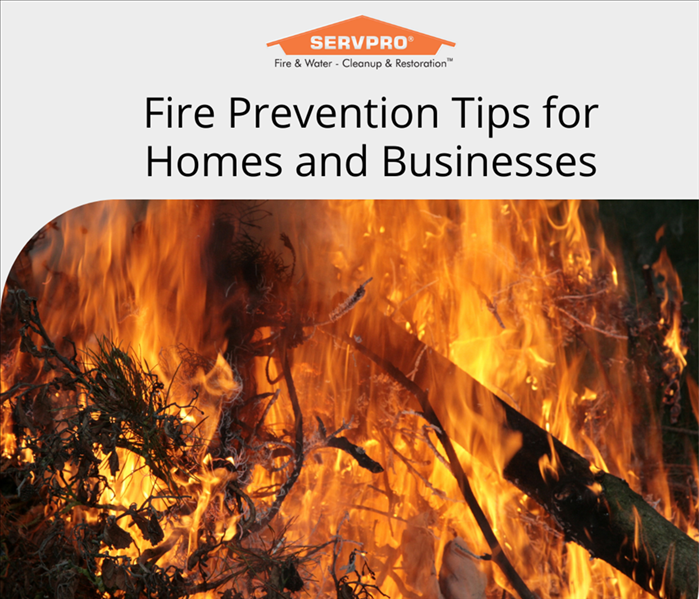 Fire safety is a top priority for both homeowners and business owners.
Fire safety is a top priority for both homeowners and business owners.
Fire safety is a top priority for both homeowners and business owners. Taking proactive steps to prevent fires can protect your property, loved ones, and employees from devastating losses. Follow these essential fire prevention tips to safeguard your home or business.
1. Install and Maintain Smoke Alarms
Why It Matters: Smoke alarms provide early warnings that save lives and reduce property damage.
- For Homes: Install smoke alarms in every bedroom, outside sleeping areas, and on every level.
- For Businesses: Place alarms in high-risk areas like kitchens, break rooms, and storage spaces.
- Maintenance Tip: Test alarms monthly, replace batteries yearly, and install new units every 10 years.
2. Practice Safe Cooking Habits
Why It Matters: Cooking is a leading cause of house fires and injuries.
- Never leave food unattended while cooking.
- Keep flammable materials—like towels and paper—away from stovetops.
- For Businesses: Train kitchen staff on fire safety and equipment use.
3. Use Electrical Systems Safely
Why It Matters: Faulty wiring and overloaded circuits are major fire hazards.
- Avoid overloading power outlets and extension cords.
- Check for damaged or frayed cords and replace them immediately.
- Hire licensed electricians for routine inspections and repairs.
4. Store Flammable Materials Properly
Why It Matters: Flammable liquids and materials can ignite easily if not stored correctly.
- Store flammable substances in their original containers, away from heat sources.
- For Businesses: Follow OSHA guidelines for handling and storing flammable materials.
5. Create and Practice a Fire Escape Plan
Why It Matters: A well-prepared plan can save lives in an emergency.
- For Homes: Develop an escape plan with two exits per room and a designated meeting spot. Practice with your family.
- For Businesses: Implement an emergency action plan, conduct regular fire drills, and post clear evacuation routes.
6. Use Heating Equipment Safely
Why It Matters: Space heaters and fireplaces are common causes of winter fires.
- Keep space heaters at least three feet from flammable objects.
- Have chimneys and fireplaces professionally cleaned and inspected annually.
7. Install Fire Suppression Systems
Why It Matters: Fire extinguishers and sprinklers can stop small fires before they spread.
- Keep fire extinguishers in accessible areas throughout your property.
- For Businesses: Invest in automatic sprinkler systems for enhanced fire protection.
Fire Damage Restoration and Recovery
Despite the best precautions, fires can still occur. If you experience fire damage, professional restoration services can help with:
- Smoke and soot cleanup
- Odor removal
- Structural repairs
Stay proactive with fire prevention to protect your home or business. If fire damage occurs, expert restoration services can help you recover quickly and safely.
As a trusted leader in the restoration industry, SERVPRO of Newton / Wellesley has the advanced training and equipment needed to restore your home and business.
Heart Health and a Healthy Home: Creating a Safe Environment for Your Well-Being
2/12/2025 (Permalink)
 February is American Heart Month, a time dedicated to raising awareness about cardiovascular health and ways to protect your heart.
February is American Heart Month, a time dedicated to raising awareness about cardiovascular health and ways to protect your heart.
February is American Heart Month, a time dedicated to raising awareness about cardiovascular health and ways to protect your heart.
While diet, exercise, and regular check-ups are essential, your home environment also plays a significant role in your overall well-being.
From indoor air quality to stress reduction, a clean and healthy living space can have a direct impact on heart health. Let’s explore the connection between your home and your heart—and the steps you can take to support both.
1. Breathe Easy with Clean Indoor Air
Poor indoor air quality can contribute to respiratory issues, increased stress levels, and cardiovascular strain. Dust, mold, and airborne pollutants can trigger inflammation and make it harder for your heart to function properly.
Heart-Healthy Home Tips:
- Clean Regularly – Dust surfaces, vacuum with a HEPA filter, and wash bedding to reduce allergens.
- Control Humidity – Use a dehumidifier to prevent mold growth and maintain indoor humidity between 30-50%.
- Change Air Filters – Replace HVAC filters every 1-3 months to ensure proper air circulation.
- Let Fresh Air In – Open windows when weather permits to improve ventilation.
2. Reduce Stress by Decluttering Your Space
A cluttered home can lead to feelings of overwhelm and stress, which are known risk factors for high blood pressure and heart disease. Creating an organized, relaxing space can reduce anxiety and promote heart health.
Heart-Healthy Home Tips:
- Declutter Daily – Set aside 10 minutes each day to tidy up.
- Organize for Functionality – Arrange items so they’re easy to find and put away.
- Create Relaxation Zones – Dedicate spaces for unwinding, such as a cozy reading nook or meditation area.
3. Keep Your Home Mold-Free
Mold thrives in damp environments, making water damage and high humidity the main culprits.
Heart-Healthy Home Tips:
- Address Water Damage Quickly – Fix leaks and clean up water intrusions immediately.
- Use Exhaust Fans – Properly ventilate kitchens, bathrooms, and laundry rooms to reduce moisture buildup.
- Monitor for Mold – Regularly inspect hidden areas, like behind appliances and under sinks, for mold growth.
4. Minimize Chemical Exposure in Your Home
Household cleaners, air fresheners, and even some furniture can release volatile organic compounds (VOCs), which may contribute to inflammation and stress on your body—including your heart.
Heart-Healthy Home Tips:
- Opt for Natural Cleaners – Use vinegar, baking soda, and lemon as non-toxic alternatives.
- Read Labels Carefully – Look for products labeled “low-VOC” or “fragrance-free”.
- Ventilate When Cleaning – Open windows and use fans to improve airflow.
5. Create a Safe and Supportive Environment
A well-maintained home reduces risks that can cause stress or injuries. Slip-and-fall hazards, fire risks, and poor lighting can all lead to accidents, adding unnecessary strain to your heart.
Heart-Healthy Home Tips:
- Install Smoke & Carbon Monoxide Detectors – Ensure alarms are functional and placed in key areas.
- Eliminate Trip Hazards – Secure loose rugs and remove clutter from walkways.
- Improve Lighting – Use adequate lighting to enhance safety and reduce strain on your eyes.
Your Heart Deserves a Healthy Home
Taking care of your heart goes beyond just healthy eating and exercise—it includes creating a safe, clean, and stress-free living environment. By prioritizing air quality, organization, mold prevention, and chemical safety, you can support your cardiovascular health and enjoy greater peace of mind.
At SERVPRO of Newton/Wellesley, we specialize in restoring homes to safe, healthy conditions. Whether you're dealing with mold, water damage, or air quality issues, our trained professionals are here to help.
Let’s work together to create a home that’s as healthy as your heart deserves.
Why SERVPRO Is the Go-To Restoration Partner for Insurance Professionals
2/4/2025 (Permalink)
 As an industry leader, SERVPRO of Newton/Wellesley has the advanced training and equipment to restore homes and businesses quickly and effectively.
As an industry leader, SERVPRO of Newton/Wellesley has the advanced training and equipment to restore homes and businesses quickly and effectively.
Why SERVPRO Is the Go-To Restoration Partner for Insurance Professionals
When disaster strikes, property owners turn to their insurance providers to restore their homes and businesses. Insurance professionals, in turn, need a reliable restoration partner to ensure fast, efficient, and high-quality service. SERVPRO has earned the trust of insurance professionals nationwide by providing seamless collaboration, efficient claims handling, and exceptional restoration services.
A Proven Process for Insurance Success
SERVPRO's expertise lies in rapid response, damage mitigation, and efficient property restoration. Here’s how we support insurance professionals every step of the way:
1. 24/7 Rapid Response
Time is critical in restoration, and SERVPRO’s network of over 2,000 franchise locations ensures help is always nearby. Whether it's water damage, fire, mold, or storm cleanup, our teams are ready to respond within hours—minimizing secondary damage and reducing overall claim costs.
2. Transparent Communication & Documentation
Clear and accurate documentation is essential for smooth claims processing. SERVPRO provides:
- Photos of damage and progress
- Itemized estimates
- Daily job updates
- Proof of restoration completion
This transparency keeps adjusters, agents, and customers informed, preventing surprises and delays in the claims process.
3. Cutting-Edge Technology
SERVPRO uses advanced restoration techniques and proprietary software to track jobs and document progress. Our digital tools give insurance professionals real-time access to updates and reports for greater efficiency.
4. Standardized Pricing for Consistency
Insurance professionals can trust that SERVPRO’s pricing aligns with industry standards. We use the same estimating software as insurance companies, ensuring consistency, accuracy, and fair pricing on every job.
5. Certified & Highly Trained Experts
Our team undergoes rigorous training and certification to stay current with industry standards and best practices. Whether handling residential losses or complex commercial claims, SERVPRO professionals are equipped to manage any restoration scenario.
A Partnership Built on Trust
SERVPRO does more than restore properties—we provide peace of mind. By streamlining claims, reducing costs, and exceeding customer expectations, we’ve become the preferred restoration partner for insurance companies of all sizes.
When disaster strikes, trust SERVPRO to be the reliable, efficient partner your insurance team needs. As an industry leader, SERVPRO of Newton/Wellesley has the advanced training and equipment to restore homes and businesses quickly and effectively.
Preparing Your Home or Business for Storm Season
1/21/2025 (Permalink)
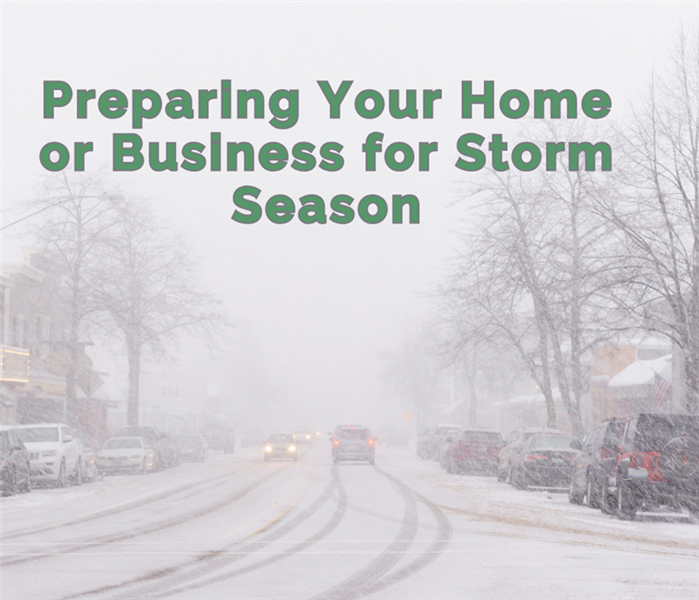 Storm season can bring unexpected challenges, but with proactive measures, you can safeguard your property and reduce potential damage.
Storm season can bring unexpected challenges, but with proactive measures, you can safeguard your property and reduce potential damage.
Storm season can bring unexpected challenges, but with proactive measures, you can safeguard your property and reduce potential damage.
Steps to Protect Your Property
Seal Windows and Doors
Inspect for gaps and use weatherproofing materials to prevent water intrusion.
Maintain Gutters and Downspouts
Clear debris to ensure proper water drainage and avoid flooding.
Secure Outdoor Items
Bring in or anchor furniture, tools, and equipment to prevent wind damage.
Create an Emergency Plan
Being prepared can make all the difference during a storm. Include these key elements:
Emergency Contacts
Keep important numbers, including SERVPRO’s, for quick restoration assistance.
Evacuation Route and Safe Shelter
Identify the safest path and location to protect your family or employees.
Inventory of Important Documents and Valuables
Secure essential paperwork and valuable items in waterproof containers.
When severe storms strike, we are here to help. From floodwaters to wind damage, we specialize in restoring homes and businesses with:
Fast Response Times
Minimizing downtime and mitigating damage.
Advanced Training and Equipment
Our team at SERVPRO of Newton / Wellesley is highly trained and equipped to handle storm-related restoration.
Trust us to restore your property and bring peace of mind after the storm.
Stay prepared, stay safe, and count on us for expert restoration services.
Fire Damage: Steps to Take Before Help Arrives
1/16/2025 (Permalink)
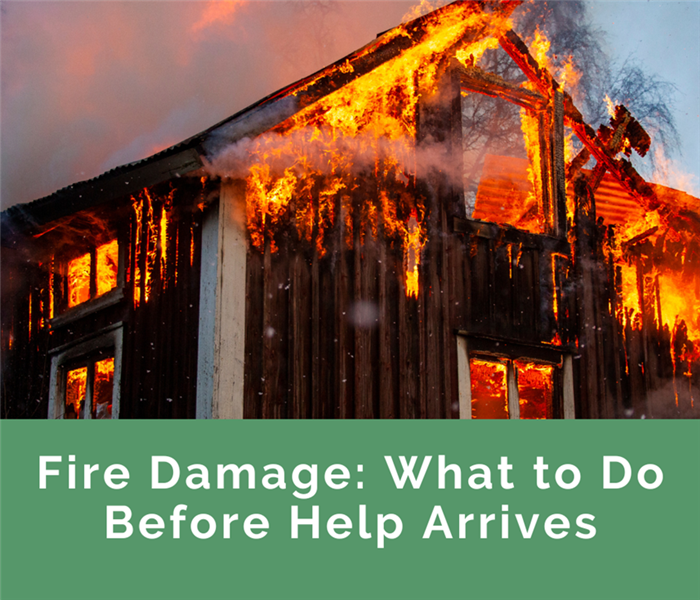 Experiencing a fire can be overwhelming, but taking the right actions afterward can make a significant difference.
Experiencing a fire can be overwhelming, but taking the right actions afterward can make a significant difference.
Experiencing a fire can be overwhelming, but taking the right actions afterward can make a significant difference.
Follow this guide to address fire damage safely while waiting for professional assistance.
1. Prioritize Safety
Your safety is paramount. Do not re-enter the property until the fire department declares it safe. Be aware of potential hazards such as structural instability, lingering smoke, and electrical dangers.
2. Document the Damage
When it’s safe to do so, take clear photos and videos of the fire damage. This documentation will be crucial for your insurance claim and help ensure you receive the compensation you deserve.
3. Avoid Cleaning on Your Own
Fire damage requires specialized cleaning techniques. Attempting to clean smoke or soot yourself can inadvertently spread contaminants or worsen the damage. Leave the restoration to trained professionals.
4. Trust the Experts
When our team arrives, we’ll assess the damage, develop a detailed restoration plan, and begin cleaning, deodorizing, and repairing your property. Our specialists are equipped to handle even severe fire damage efficiently and effectively.
As a trusted leader in the restoration industry, SERVPRO of Newton/Wellesley combines advanced training with state-of-the-art equipment to restore your home or business to its pre-fire condition.
The Hidden Risks of Mold and How We Can Help
1/9/2025 (Permalink)
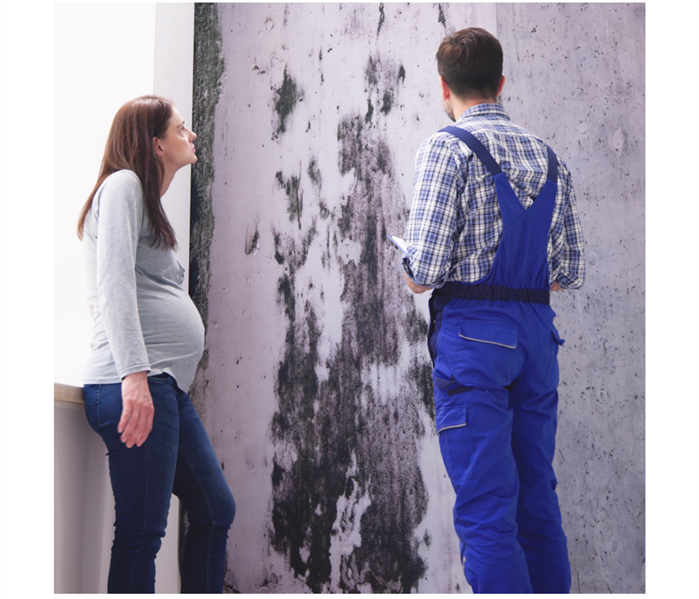 Common Causes of Mold in Homes and Businesses
Common Causes of Mold in Homes and Businesses
Mold may start as a minor inconvenience, but if left untreated, it can escalate into a serious structural hazard. Here’s what you need to know about mold risks and how we can assist you.
Common Causes of Mold in Homes and Businesses
Mold thrives in damp, humid environments and is often triggered by:
- Water damage from flooding or leaks.
- Plumbing issues that go unnoticed.
- Poor ventilation in moisture-prone spaces.
Bathrooms, basements, and areas with frequent condensation are especially at risk.
Warning Signs You Need Professional Mold Removal
- Persistent musty odors.
- Visible discoloration on walls, ceilings, or floors.
If you notice these signs, acting promptly can prevent further damage.
SERVPRO’s Comprehensive Mold Remediation Process
Our highly trained technicians don’t just remove mold—they address its root cause. Our process includes:
- Assessment: A detailed inspection to determine the extent of the mold problem.
- Containment: Measures to prevent mold spores from spreading during remediation.
- Advanced Cleaning: Safe and effective techniques to eliminate mold.
- Restoration: Repairs to return your property to its pre-mold condition.
Proactive Tips to Prevent Mold Growth
- Maintain humidity levels below 60%.
- Address leaks and water damage without delay.
- Ensure proper ventilation in moisture-prone areas like bathrooms and kitchens.
As a trusted leader in restoration, SERVPRO of Newton/Wellesley combines advanced training with state-of-the-art equipment to help you eliminate mold and restore your home or business efficiently.
Top 5 Reasons to Call Us After Water Damage
1/1/2025 (Permalink)
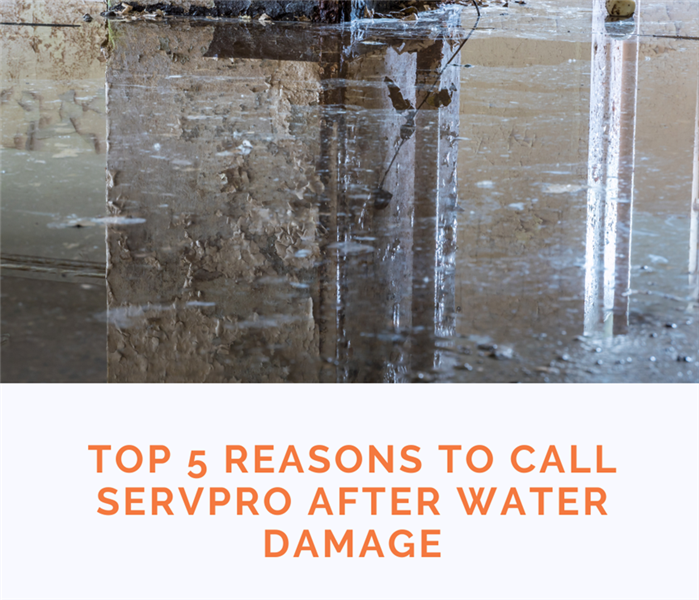 As a trusted leader in the restoration industry, SERVPRO of Newton/Wellesley is equipped with the advanced training and tools needed to restore.
As a trusted leader in the restoration industry, SERVPRO of Newton/Wellesley is equipped with the advanced training and tools needed to restore.
Water damage often strikes without warning, leaving your home or business at risk of long-term consequences if not addressed quickly. Here’s why reaching out to us after water damage is the best decision you can make:
1. Act Quickly to Prevent Mold Growth
Water damage can create the perfect environment for mold to grow within 24–48 hours. Our team responds promptly to mitigate water damage and stop mold before it takes hold.
2. Advanced Water Removal and Drying Technology
We use state-of-the-art equipment, from powerful water extractors to advanced drying systems, to ensure your property is thoroughly dried—even in hard-to-reach places like behind walls or beneath flooring. This meticulous approach helps prevent further structural damage.
3. Experienced Professionals You Can Trust
Our highly trained team has years of expertise in water damage restoration, handling everything from minor leaks to major floods. We provide safe, efficient, and customized care to restore your property with confidence.
4. Streamlined Insurance Claim Assistance
Dealing with insurance after water damage can be stressful. We work directly with insurance providers, offering detailed documentation and expert guidance to make the claims process as smooth as possible.
5. Proven Results That Speak Volumes
We’ve helped countless property owners recover from water damage. Whether it’s a homeowner whose basement was salvaged after a pipe burst or a business that reopened quickly after a flood, our success stories reflect our dedication and expertise.
Don’t let water damage take a toll on your property. As a trusted leader in the restoration industry, SERVPRO of Newton/Wellesley is equipped with the advanced training and tools needed to restore your home or business efficiently and effectively.
Safeguard Your Business with Commercial Restoration: From Disaster to Recovery
12/17/2024 (Permalink)
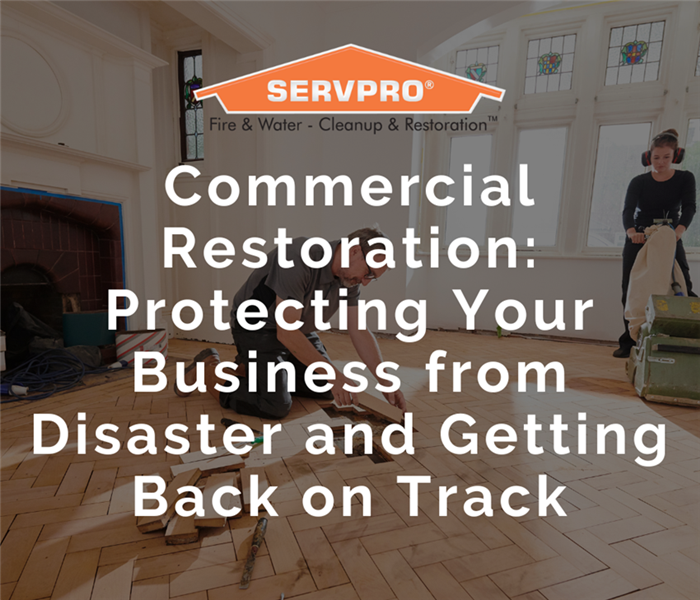 Facing a disaster is daunting, but with the right preparation and restoration team, your business can recover efficiently.
Facing a disaster is daunting, but with the right preparation and restoration team, your business can recover efficiently.
Unexpected damage from water, fire, mold, or severe weather can leave businesses reeling. Beyond disrupting daily operations, such events affect employees, customers, and profits. Commercial restoration plays a vital role in helping businesses recover quickly and efficiently. This guide outlines the restoration process, common types of damage, and tips to safeguard your business for the future.
The Importance of Commercial Restoration
Every hour of downtime due to damage costs your business revenue and productivity. Prompt restoration minimizes the financial and operational impact, ensuring you can resume operations safely. Professional restoration teams handle cleanup, repairs, and health considerations, creating a secure environment for employees and customers to return confidently.
Types of Commercial Damage
Water Damage
- Causes: Burst pipes, roof leaks, flooding, or sprinkler malfunctions.
- Impact: Can lead to structural issues, mold growth, and ruined inventory or equipment.
- Restoration: Involves water extraction, drying, dehumidification, and monitoring to eliminate moisture completely.
Fire and Smoke Damage
- Causes: Electrical malfunctions, kitchen fires, or industrial accidents.
- Impact: Soot and smoke penetrate surfaces, leaving odors and health hazards.
- Restoration: Includes soot removal, deodorizing, and cleaning with specialized methods to prevent further damage.
Mold and Fungal Growth
- Causes: High humidity, water damage, or poor ventilation.
- Impact: Damages walls, floors, and HVAC systems, posing health risks.
- Restoration: Mold containment, air filtration, removal, and preventive measures to avoid recurrence.
Storm and Wind Damage
- Causes: Hurricanes, tornadoes, or heavy rains.
- Impact: Ranges from broken windows and roof damage to flooded basements and fallen debris.
- Restoration: Repairs to structures, water extraction, debris removal, and reconstruction as needed.
The Commercial Restoration Process
1. Assessment and Inspection
Restoration experts conduct a thorough on-site evaluation to identify damage and create a tailored plan. This step includes moisture mapping, air quality checks, and structural assessments.
2. Mitigation and Containment
Preventing further damage is critical. This includes:
- Boarding windows or covering roofs.
- Extracting water and deploying dehumidifiers.
- Setting up barriers to contain affected areas.
3. Cleanup and Removal
Damaged materials like drywall, furniture, and equipment are removed. Specialized cleaning processes handle soot, mold, and water residue, ensuring a safe environment.
4. Restoration and Repair
This phase involves repairing structural damage, repainting, and restoring interiors. Additional steps may include odor removal and refinishing walls or floors.
5. Final Inspection and Prevention Recommendations
Before reopening, specialists ensure the property is fully restored and provide tips to reduce future risks, such as moisture control or upgraded fireproofing.
Choosing the Right Commercial Restoration Partner
When disaster strikes, selecting a skilled restoration partner is crucial. Look for a team with:
- 24/7 Availability: Quick response minimizes damage.
- Advanced Equipment and Techniques: Commercial spaces require specialized tools.
- Knowledge of Commercial Codes: Compliance with regulations is essential, especially in healthcare or food service industries.
- Project Management Expertise: A reliable partner coordinates permits, contractors, and inspections seamlessly.
Proactive Steps to Protect Your Business
To reduce downtime and potential damage, implement these measures:
- Routine Maintenance: Regularly inspect plumbing, HVAC, electrical systems, and roofing.
- Waterproofing: Seal foundation cracks, ensure proper drainage, and install water barriers.
- Disaster Preparedness Plan: Establish evacuation routes, secure critical equipment, and create a communication strategy.
- Fire Safety: Inspect alarms, sprinklers, and extinguishers regularly.
- Insurance Review: Confirm your policy includes adequate coverage for property damage and business interruption.
Facing a disaster is daunting, but with the right preparation and restoration team, your business can recover efficiently. Whether dealing with water, fire, mold, or storm damage, proactive measures and quick action ensure minimal disruption.
As a trusted leader in the restoration industry, SERVPRO of Newton / Wellesley provides the advanced training and equipment needed to restore your business swiftly and effectively.
Frozen Pipes and Ice Dams: What to Do If You Return to Winter Water Damage
12/10/2024 (Permalink)
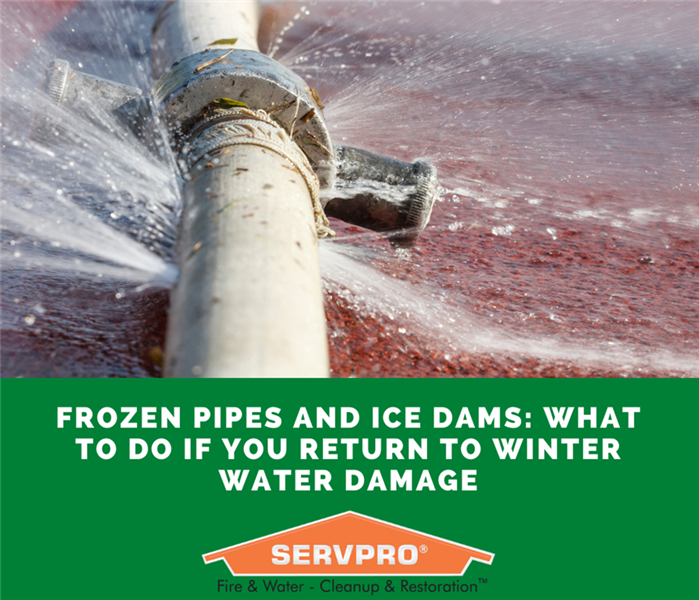 By spotting early warning signs, acting swiftly, and taking preventive measures, you can protect your home from frozen pipes and ice dam damage.
By spotting early warning signs, acting swiftly, and taking preventive measures, you can protect your home from frozen pipes and ice dam damage.
Winter vacations are the perfect time to relax, but coming home to frozen pipes or water damage can quickly undo that peace of mind. When temperatures drop, frozen pipes and ice dams can lead to leaks, water damage, and costly repairs if not addressed promptly. Here's everything you need to know to identify, resolve, and prevent these common winter hazards.
1. Understanding the Risks: Frozen Pipes and Ice Dams
- Frozen Pipes: When temperatures plunge, water inside pipes can freeze and expand, causing cracks or bursts. Once thawed, the resulting leaks can flood your home and cause extensive damage.
- Ice Dams: Ice dams form when melting snow on your roof refreezes at the edges, creating blockages. This trapped water can seep into your home, damaging walls, ceilings, and insulation.
2. Signs of Frozen Pipes or Ice Dam Damage
Be vigilant for these warning signs:
- Water Stains: Discoloration on walls or ceilings may point to leaks from melting ice dams.
- Low Water Pressure: Weak water flow could indicate frozen pipes restricting water movement.
- Pooling Water or Damp Spots: Look for unexpected moisture near exterior walls, basements, or under sinks.
- Frost on Pipes: Pipes in unheated spaces, like basements or attics, may visibly frost over if frozen.
3. Immediate Steps to Take
If you discover water damage or suspect an issue, act quickly to minimize harm:
- Shut Off Water: Turn off your home's main water supply to halt leaks from a burst pipe.
- Turn Off Power: For flooded areas, cut electricity to avoid dangerous water-electricity interactions.
- Drain Pipes: Open all faucets to release trapped water and reduce pipe pressure.
- Remove Standing Water: Use towels or a wet-dry vacuum to mop up water, especially on carpets or wood floors, to prevent mold growth.
4. Thawing Frozen Pipes Safely
For frozen but intact pipes, follow these steps:
- Apply Heat Gradually: Use a hair dryer, space heater, or heating pad to warm pipes slowly. Avoid open flames or intense heat, which can damage pipes.
- Start with Accessible Pipes: Begin with exposed pipes, then address harder-to-reach areas.
- Keep Faucets Open: A trickle of running water helps thaw pipes faster and relieves pressure.
5. Handling Ice Dam Damage
If an ice dam has caused water to infiltrate your home, take these steps:
- Inspect Insulation: Remove and replace any wet attic insulation to prevent mold growth.
- Check Walls and Ceilings: Repair damp or discolored areas quickly to avoid further damage.
- Dehumidify: Use a dehumidifier to dry out remaining moisture from walls and ceilings.
6. When to Call Professionals
Certain situations require expert help, including:
- Significant flooding or water damage.
- Mold growth on affected surfaces.
- Water infiltration into electrical systems or insulation.
Professional water restoration teams, like SERVPRO of Newton / Wellesley, use advanced tools such as industrial fans, dehumidifiers, and moisture meters to ensure a thorough cleanup.
7. Preventing Future Issues
Take these preventive measures to safeguard your home:
- Insulate Pipes: Wrap exposed pipes with foam or insulation tape.
- Leave Faucets Dripping: A small trickle of water helps prevent freezing during extreme cold.
- Enhance Attic Insulation: Proper insulation slows roof snowmelt, reducing ice dam risks.
- Clear Gutters: Remove debris from gutters to allow melting snow to drain freely.
8. Pre-Travel Precautions
Before leaving for a winter getaway, prepare your home:
- Set Your Thermostat: Keep it at least 55°F to prevent freezing.
- Shut Off Water Supply: If feasible, turn off the main water line and drain pipes.
- Open Cabinets: Allow warm air to circulate around pipes under sinks.
Winter vacations should leave you feeling refreshed, not stressed. By spotting early warning signs, acting swiftly, and taking preventive measures, you can protect your home from frozen pipes and ice dam damage.
SERVPRO of Newton / Wellesley has advanced training and equipment to restore your home or business, giving you peace of mind during winter and beyond.
Home Restoration 101: Recovering from Holiday Cooking Mishaps and Kitchen Fires
12/4/2024 (Permalink)
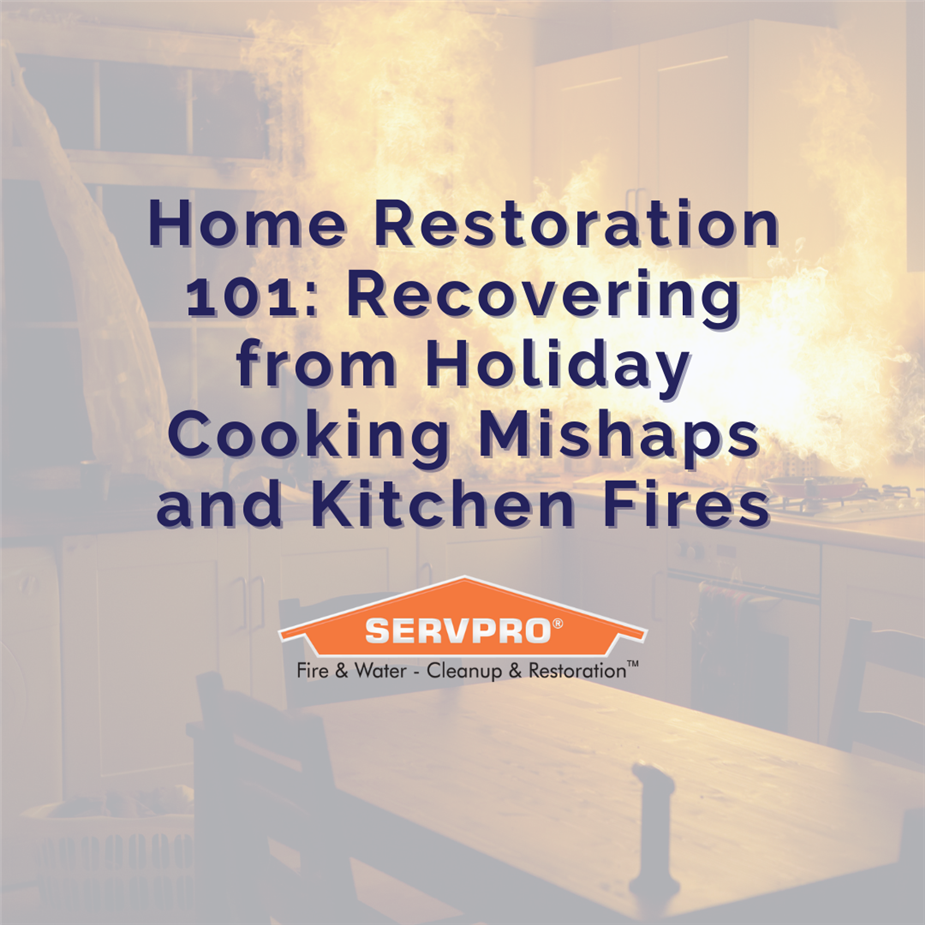 With advanced training and equipment, we’re ready to restore your kitchen and home after any holiday mishap. Contact us at (617) 332-9000.
With advanced training and equipment, we’re ready to restore your kitchen and home after any holiday mishap. Contact us at (617) 332-9000.
The holiday season brings joyful gatherings, delicious meals, and unfortunately, a higher risk of kitchen accidents. With the increased hustle and bustle, small cooking mishaps or even kitchen fires can happen. Knowing how to prevent, respond to, and recover from these incidents can save time, stress, and expense. Here’s your guide to ensuring a safe holiday kitchen and effectively managing any unexpected damage.
Preventing Holiday Cooking Fires
Before discussing restoration, let’s focus on avoiding cooking fires altogether. These key precautions can help:
1. Stay Present and Focused
Holiday distractions can easily lead to accidents. Never leave a hot stovetop or oven unattended. If you must step away, turn off the heat.
2. Wear Safe Cooking Attire
Avoid loose clothing or long sleeves that can catch fire. Choose snug-fitting clothing or roll up your sleeves while cooking.
3. Keep Flammables Away from Heat
Store towels, paper products, and wooden utensils far from stovetops and ovens. A tidy workspace reduces fire risks.
4. Have a Fire Extinguisher Handy
Keep a fire extinguisher nearby, ensuring it’s rated for kitchen use. Familiarize yourself with its operation in advance.
5. Handle Oil and Grease with Care
Hot oil can overheat and ignite quickly. Always watch it closely and never use water to extinguish a grease fire—it will only make it worse.
Responding to a Cooking Fire
Even with precautions, accidents happen. If a fire starts:
Turn Off the Heat Source
For stovetop fires, turn off the burner immediately. For oven fires, shut off the oven and keep the door closed to suffocate flames.
Cover Small Fires
Use a metal lid or baking sheet to smother flames on the stovetop. Never use water, flour, or anything combustible.
Use a Fire Extinguisher
If the fire grows beyond your control, use an extinguisher. Call emergency services if needed.
Ventilate the Kitchen
After extinguishing the fire, open windows and use fans to clear smoke. Avoid using the kitchen vent hood until it’s inspected for damage.
Recovering from Fire or Smoke Damage
If a mishap results in fire or smoke damage, take these steps to restore your kitchen:
1. Assess the Damage
Inspect the area to determine whether the damage is surface-level or requires deeper cleaning or repairs.
2. Remove Soot and Smoke Residue
- Soot: Use a vacuum with a brush attachment to gently remove loose soot from surfaces without smearing it.
- Smoke Residue: Clean walls, counters, and cabinets with a mix of water, vinegar, and mild detergent. Rinse thoroughly.
3. Eliminate Smoke Odors
- Ventilation: Open windows and use fans to circulate fresh air.
- Baking Soda & Vinegar: Sprinkle baking soda on soft surfaces or wipe hard surfaces with vinegar to neutralize odors.
- Air Purifiers: Use devices with HEPA filters or place activated charcoal in the room to absorb lingering smells.
4. Deep Clean Appliances
- Oven & Stovetop: Follow your appliance manual for safe, thorough cleaning. Avoid using abrasive chemicals.
- Vent Hood & Filters: Remove and clean filters to eliminate smoke and grease buildup. Replace them if necessary.
5. Call Professionals for Extensive Damage
If the damage extends to walls, ceilings, or beyond the kitchen, consider hiring restoration experts to address stubborn stains, odors, or structural issues.
6. Repair or Replace Damaged Areas
- Cabinets & Counters: Sand, repaint, or replace burned or stained surfaces.
- Flooring: Address water or fire damage by patching or replacing sections as needed.
Keeping Your Kitchen Safe Year-Round
Prevent future accidents with these habits:
- Regularly clean your oven, stovetop, and vent hood to minimize grease buildup.
- Test smoke detectors monthly to ensure proper functionality.
- Review kitchen safety protocols with family members so everyone knows what to do in an emergency.
Cooking mishaps are common during the holidays, but preparation and quick action can minimize their impact. With these tips, you’ll keep your kitchen safe, restore it effectively if needed, and enjoy a festive season with peace of mind.
Need Restoration Help?
SERVPRO of Newton/Wellesley is a trusted leader in the restoration industry. With advanced training and equipment, we’re ready to restore your kitchen and home after any holiday mishap. Contact us at (617) 332-9000 for expert assistance.






 24/7 Emergency Service
24/7 Emergency Service









